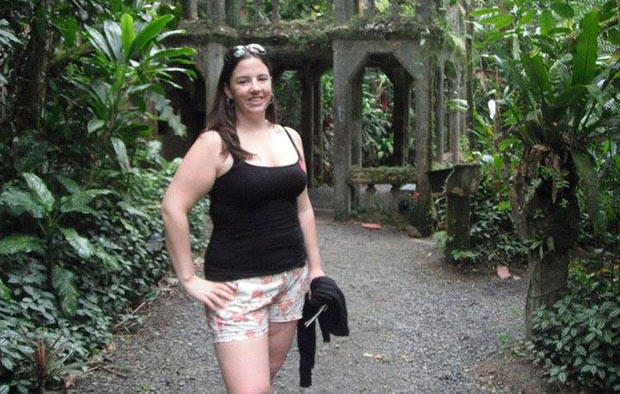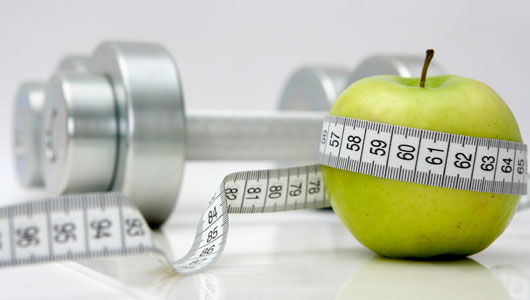I Lost 50 Pounds and Gained It All Back. Heres What Went Wrong.
This article was written by Kelly Burch and provided by our partners at Prevention.
As a teen, I was driving in the car with my mom when she mused, "I would really like to lose 15 pounds."
"I'd really like to lose 50," I replied, in the way one says they'd really like to win the lottery. The number seemed completely and totally out of reach.
Despite being generally healthy, I had always been overweight, and losing 50 pounds seemed about as realistic as joining the Olympic figure skating team. Although I had half-heartedly dabbled in healthy eating and exercise for years, I never truly committed—and I couldn't imagine that I ever would.
But a few years later, right before I left for college, I was getting a routine physical when my doctor gently brought up weight loss. "You know," she said, "this is a great time to make changes. Your whole life is changing, so you can really set new patterns."
This resonated with me. I could tap into the so-called "fresh start effect," which says that the beginning of a new cycle (like a Monday, a new month, etc.) is the best time to start a new habit. I could use my transition into adulthood to delve into a brand-new healthy lifestyle. (Looking to conquer your weight issues? Prevention has smart answers—get 2 FREE gifts when you subscribe today.)
 Photograph courtesy of Kelly Burch
Photograph courtesy of Kelly Burch
Taking action
At my doctor's suggestion, I signed up for the Weight Watchers online system the same week that I moved into my dorm room. Tracking points was a great way to know exactly what I was eating, although dining in the college cafeteria sometimes made it tricky. Meanwhile, I used most of my free time to visit my university's beautiful gym.
Soon I was making little signs for the desk in my dorm room: "Goodbye 220s!" "Goodbye 210s" and finally, most exciting, "Goodbye 200s." I was extremely proud of myself for losing weight during freshman year, a time when so many students tend to put on the "freshman 15." I was looking and feeling great, and whenever I saw my hand-written signs I vowed to never let the scale hit those numbers again.
Over the next few years I continued my healthy habits. Although I stopped tracking points, I wrote down what I ate in a food journal in order to keep myself accountable. I continued to tap into my newfound love of fitness, running 5-Ks and learning to lift heavy weights in the gym. Slowly but steadily, the pounds continued to disappear.
Three years after beginning my healthy journey, for the first time in my memory, the scale hit the 170s. I had made it. My BMI and body fat percentage were excellent, I was undeniably fit, and I had lost 50 pounds.
Little did I know that four years later I'd have gained all the weight back, and then some.
RELATED: How To Start Walking When You Have 50+ Pounds To Lose
Undoing the progress
When I think about what went wrong, it all comes down to getting too comfortable.
I had lost 50 pounds relatively slowly, over three years. I did it the "right" way, avoiding fad diets or extreme measures. I truly felt that I had made healthy living my lifestyle. But after three years, I was utterly sick of writing down everything I ate or entering calories into an app. I just wanted to eat intuitively and to implement what I had learned without such a structured system. So I stopped tracking, and that's when the pounds started to creep back on.
At first, I told myself that my body was adjusting. In part, this was true. When I hit the 170s, I had been exercising about two hours a day, at least five days a week. At the time I had no kids and a light work schedule, so this was manageable, but in the long-term it was unrealistic.
When the regain started, I was busy: I was so focused on launching my career, getting married, and setting up a house that at first I didn't notice what was happening. I was still following a generally healthy lifestyle—eating tons of salads, fresh fish, and spinach omelets with only occasional "treats"—but I wasn't as strict as I had been before. Getting to the gym daily was impossible, and I began grabbing an occasional drive-through lunch between appointments (even though I once viewed fast food as completely inedible). It didn't happen more than twice a month, but it was symbolic of the many small ways I had let my health slip.
When I hovered just below 200 pounds a year later, I told myself that that is where my body returned to naturally. When I saw 210 (about three years after my lightest) I spiraled into denial, not stepping on the scale for a very long time. Around that time, I tried on a dress that had fit at my slimmest. When it didn't zip, I mentioned the need for slimming underwear. "There's no way it's going to close," my friend said gently.
Most of what I was eating was pretty healthy, and I was still a regular at the gym; I was even working with a personal trainer. In fact, I focused more on exercise than nutrition because working out was fun. I loved exercise but hated tracking calories, and I told myself that was fine: Although I was heavy, I was still fit.
RELATED: 15 Teeny Tiny Changes To Lose Weight Faster
Back to reality
The pounds continued to pile on, and I eventually reached a point when I couldn't deny that it was a problem. I was only 26, yet my knees and hips were aching. I was frustrated, embarrassed, and heartbroken—and I was also angry.
I have a body that requires extra work to stay lean. I cannot not just "eat healthy and exercise," that simple phrase we hear so often that makes weight loss sound simple. For me, sustained weight loss and maintenance was always going to be intensive, hard work, and I wasn't yet ready to accept that. I had a baby and a career and I didn't have the time or energy to put in the effort.
When my daughter was nearly two—I was 27 at the time—I realized that I could no longer claim "baby weight." I was about 20 pounds heavier than when I started college, which was terrifying. Somehow, I had managed to lose 50 pounds and regain 70.
I started my recommitment to weight loss by contacting a nutritionist and a new personal trainer. "You're doing everything right," they said. "Let's give it a month." But a month came and went, and despite their assurances that I would see a change, the scale did not budge.
Around that time I read about The Biggest Loser weight loss study. Doctors followed contestants from the TV show for six years after the cameras stopped rolling. They discovered that most of the contestants regained the weight they had lost, but through no fault of their own: Research showed that the former contestants' resting metabolisms were drastically slower than those of their peers. Their bodies were sabotaging their efforts, fighting hard to regain the lost weight. "It is frightening and amazing," Kevin Hall, Ph.D. a federal researcher and expert on metabolism told the New York Times.
The study concluded that nearly anyone who loses weight will have a slower metabolism, making it harder to maintain the loss.
When I read that line, I cried. For years, I had known that I had to work extremely hard to lose even a little bit of weight. And I knew that if I wasn't meticulous about diet and exercise that I would gain it back. But deep down, I wondered if I was lying to myself or just making excuses. This study confirmed that I really do have to work harder than most people to see the same results.
As frustrating as that is, I'm now willing to give it another shot, so I'm back to tracking every bite that goes into my mouth. I've recently lost about 10 pounds, but I still have about 50 to lose, again. I know I'm unlikely to see the 170s, which I believe was the minimum for my large build; instead, a healthy body fat percentage and a weight in the 190s would be just fine with me. In order to achieve that I can't get discouraged, or resentful. Just like anyone managing a chronic health condition, I need to accept my situation and work toward the best possible outcome. For me, that means tracking my food, probably forever.
At least this time, when I feel down, I can remind myself that the seemingly impossible goal of losing 50 pounds is achievable. My own story is proof of that.
Kelly Burch is a freelance writer living in New Hampshire. You can connect with her on Facebook or on Twitter @writingburch.
-
3 Lies That Are Sabotaging Your Weight-Loss
If youve tried every diet trick in every diet book and fat still cling
-
Why Khloé Kardashian Doesnt Believe in Dieting—But Kim Does
The Kardashians may share the same DNA, but that doesnt mean they shar
-
How Eating More Often Helped Me Lose 133 Pounds
Before: 328 After: 195 The Lifestyle When I graduated high school, I
-
How to detox and get rid of cellulite with essential oils
-
Are Pinterest and Instagram tempting you?
-
10 Effective Morning Exercises for Weight Loss
Do you know it is best to work out in the morning? The best thing you
- DON'T MISS
- 3 Filling winter low-carb lunch ideas
- Ways to burn 500 kilojoules
- The Exercise That Could Help You Eat Less
- How many calories do you burn while vacuuming?
- ONE SIMPLE HABIT THAT WILL HELP YOU STAY LEAN AND BEAUTIFUL
- Dont give up on weight-loss resolutions
- The Truth About “Teatoxes”
- Laugh and lose weight
- Crazy celebrity diets - Dont try these at home
- Should You Be Counting Macronutrients Instead of Calories to Lose Weight?




